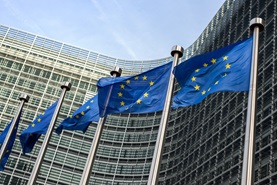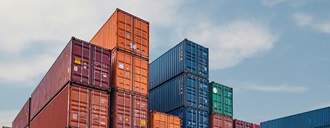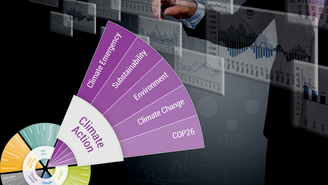Looking at ESG in Crypto, Blockchain, and Public Equities
Beyond the volatile crypto market, blockchain has several features that lend well to commercial applications. Blockchain can help improve the transparency, speed and efficiency of data transfers and monetary transactions. Businesses in multiple industries are using blockchain tools to enhance payment platforms and secure supply chain management systems. Sustainalytics’ latest Thematic Research report, An ESG Lens on Blockchain and Public Equities, surveys ESG risks and opportunities related to applications of blockchain technology that are being developed by listed companies across multiple sectors of the economy.
Russia, ESG Risks in Energy, and Corporate Citizenship
As the unprecedented situation in Ukraine continues to unfold, Russia’s energy industry has remained remarkably untouched by the waves of sanctions currently being deployed against the country, despite being arguably its most important sector. While the European Union and its allies have been cautious to avoid disrupting energy flows (unlike how sanctions are currently disrupting the flow of capital), international oil companies are responding to the crisis in their own capacity.
Key Themes Shaping Proxy Voting in 2022
As the volume and breadth of ESG risk exposure continue to rise, the stage is set for another momentous proxy season. The trending topics of last year will continue to steer the agenda—with the prospect of even more substantial support from shareholders in 2022.
The Sustainability Conundrum of Living Income in Agriculture
Living Income is a crucial consideration among leading companies across some sectors and their supplier companies throughout the agricultural and food supply chain. Companies that manage ESG risk in their supply chains, making targeted investments to improve their resilience, are better positioned to build investor confidence.
Answering the Call for Progress: How Companies Can Respond to Investor Demands on DEI
In this blog post we share what companies can do to communicate their progress on diversity, equity, and inclusion (DEI) to investors and other key stakeholders, particularly with respect to gender diversity and advancing women’s socio-economic status.
EU Taxonomy in Limbo - Reporting Alignment of Article 8 and 9 Funds in 2022
For observers of the EU’s Sustainable Finance Strategy, 2022 kicked off with a crack and a bang as the European Commission went ahead with plans to include natural gas and nuclear-related activities as potentially sustainable under their ‘Green Taxonomy’. However, in midst of this furor, seemingly less attention has been paid to other components of the regulation that have quietly taken effect from the 1st of January 2022, presenting their own set of challenges.
The ESG Risks of National Oil Companies Taking Over Fossil Fuel Production from International Oil Majors
As growing pressure to cut GHG emissions is causing Western oil majors to sell their high-carbon assets, it is expected that National Oil Companies (NOCs) will pick up some of the production. For investors holding an interest in or considering investing in NOCs or sovereign debt, it is worth assessing how fossil fuel production shifts will impact their portfolio’s alignment with climate ambitions and ESG values.
What Happens When Companies are Receptive to Investor Feedback on ESG?
When companies are receptive to investor feedback, there are clear real-world impacts and positive changes. Such engagement outcomes vary and are directly tied to the company and its company-specific exposure to material ESG issues.
Maximum Impact: How Bond Impact Reporting Can Improve Corporate Decision Making
When companies measure and report the environmental and social impacts of their operations, they can demonstrate to investors large and small that their green and social bonds are reliable investments for maximum impact. Then investors can optimize their portfolios for impact as they do for risk and reward and companies can optimize their efforts to improve.
Measuring What Matters: Initiatives for Banks' Climate-Related Impact and Disclosure
To help financial institutions examining the climate impact of their portfolios, we’ve compiled a list of the initiatives and organizations offering guidance on the collection, measurement, and disclosure of climate-related financial data.
3 Reasons to Skill Up and Scale Up ESG Stewardship in 2022
As our clients and the industry at large focus on proactively mitigating risk and capitalizing on this evolving landscape, stewardship will be a key lever for savvy investors—particularly those facing external pressure to divest. Here are the ESG themes we see influencing stewardship priorities this year.
What You Don’t Know Can Hurt You: Getting to the Bottom of Supply Chain Risk
To address supply chain risk, business leaders must consider an increasingly broad range of factors in procurement, including environmental, social and governance (ESG) impacts. Investors, customers, and regulators are applying substantial pressure on companies to reduce risks like labor disruptions, workforce health and safety incidents, human rights issues, and shortages of natural resources.
5 Sustainability Themes to Expect in 2022
As we enter 2022, it struck me that VUCA--a concept that originated in the mid-1980s at the U.S. Army War College to describe the volatility, uncertainty, complexity, and ambiguity of the world after the Cold War—is still a useful framework to think of where we are now.
For Investors with Ambitions to Lead on Climate Action Post COP26
In the weeks following COP26, investors in the UK and worldwide face a myriad of upcoming climate-related regulations heading towards the implementation phase. In addition, major global coalitions such as the Glasgow Financial Alliance for Net Zero have sprung up to attempt to accelerate decarbonization via targeted investment.



















